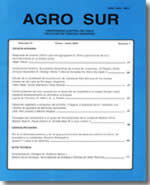EFECTO DEL RÉGIMEN PLUVIOMÉTRICO DE LA REGIÓN METROPOLITANA EN LA PRODUCCIÓN Y CALIDAD DE SEMILLAS DE Bromus berteroanus Collar
Main Article Content
Abstract
Under controlled conditions, the effect of pluviometric regimes of Semiarid Mediterranean Chilean inner dry land on production and quality of Bromus berteroanus Collar seeds was evaluated. Ten treatments were defined according to three types of years with different total rainfall (dry, normal and rainy) and each one with three distributions (early, normal and late) giving nine different pluviometric regimes; a treatment without water stress (over 50 % field capacity) was included as reference. Number of floral stems, fruits and seeds; fruit weight and their quality (full fruit, viability and germination of seeds) were measured. The potential production of the species was higher than the production obtained with normal rainfalls in the semiarid mediterranean region. The response to pluviometric regimes depended on duration, moment and magnitude of water deficit; thus with highest amount of rainfalls the fruit production was greater but the fruits were small, without seeds, had a high percentage of annex structures and low germination. It appears that the species allocates a great part of its resources to maintain the fruit quality in pluviometric regimes according the values of reference treatment, as when Bromus berteroanus grew without water stress, the quality was similar.

